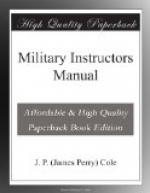The first requisite is cleanliness. Food receptacles must be scoured and covers and cracks in tin ware scraped as well as scalding the tins themselves. Have boiling hot water in tanks (galvanized iron ash cans are good) for men to wash mess kits in after meals. One can should contain soapy water so as to cut the grease from the dishes, and the second tank should contain clean, boiling water for scalding the kits. Scraps of food should be scraped from the mess tins before immersing them in water, otherwise washing water becomes filled with small particles of food. Wiping cloths will greatly add to the convenience of the men and takes but a short time to make them clean and fit for use again.
Care must be exercised over three kinds of waste:
(1) Garbage.
(2) Kitchen slops.
(3) Excreta.
Garbage can be burned in the kitchen fires. It should never stand exposed to the air, but should be tightly covered in iron cans, and should be disposed of every twenty-four hours. Kitchen help have an aversion to prompt disposal of garbage and need watching. Fly traps should be made of muslin and used freely about the kitchen.
Kitchen slops, fats, greasy water, etc., must be drained into covered pits, never allowing them to be tossed on the ground around the cook tent. A hole dug and partially filled with stones with a barrel placed upside down on them, makes a very good receptacle for kitchen slops. The barrel should be placed so that the inverted top will be a little way beneath the surface of the ground. A hole should be bored in the bottom of the barrel and a funnel inserted, through which the slops may be poured. If the soil is porous, a trough may be dug and covered with mosquito netting or cheese cloth, and the water poured through this and allowed to drain off.
Excreta is the most deadly form of waste, and too much care cannot be exercised in disposing of it. Impress upon every man that he must cover completely with dirt all excreta so that flies may not have a chance to approach it.
For short stops and while working in the field “straddle,” latrines are the best. These are shallow trenches the width of a shovel, about 12 inches wide, and several feet in length. For long stops a deep latrine is dug of the following dimensions: 2 feet wide, 6 feet deep by 15 feet long. Two posts with crotches, driven at the ends of this trench, supporting a substantial pole to make a seat * * * for convenience a hand rail placed in front of this improvised seat will add to the comfort of the men.
A more permanent latrine is made by covering the pit with a wooden box, in the top of which are cut holes of the necessary diameter. To these holes should be fitted spring covers which will shut down tightly. A wooden frame boarded around this arrangement makes a satisfactory enclosure.
A urinal made of two long boards joined together to form a V-shaped trough and drained by a pipe into the pit completes the whole. A pitch sufficient for rapid drainage should be given the urinal trough.




